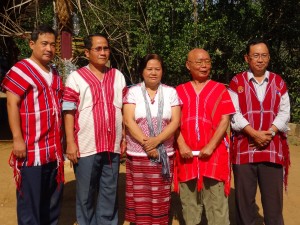KNU General Secretary, Padoh Kwe Htoo, in an exclusive interview with Karen News stressed that the KNU remains committed to peace, but warns Burma’s government to enact further reforms.
 “The KNU’s policy is unchanged, despite ceasefire negotiations with the Burma Army. Unity is important for our future struggle. Right now is a critically important time for our people.” He said in an interview with Karen News.
“The KNU’s policy is unchanged, despite ceasefire negotiations with the Burma Army. Unity is important for our future struggle. Right now is a critically important time for our people.” He said in an interview with Karen News.
“In order for us to build peace it is important the Karen people are united, and our political organization, the Karen National Union, is united. We were in an armed struggle with the government for more than 60 years, and we are now moving forward to build peace for the Karen people – now we need to have a systematic plan in place to ensure lasting peace.”
Padoh Kwe Htoo expressed unease over the Burma government’s plans to construct mega development projects in Karen State, and the impact these would have on the Karen people.
“We are concerned that the government will use peace talks as a way to enable massive development projects which could threaten local livelihoods. Although industrial development is essential, our stand on development is that it has to be of benefit to the people, and not corrupt officials.”
Padoh Kweh Htoo noted that the KNU would have to involved more women in the political process, as well as cooperating with other ethnic political groups in Burma in order to reach a lasting peace with Burma’s government.
“We also need our women’s involvement in moving forward, and women leadership roles have to be promoted and encouraged. As the organization representing and leading our people we have formed a human rights commission. The problems in Burma not only affect the Karen people, we need to cooperate with other ethnic groups and other democratic groups. The political dialogue [with the government] is not only for the Karen, but will include the other ethnic organizations.”
Padoh Kwe Htoo said that the KNU would look for peace through political discussions and negotiations, and not on the battlefield.
“Our policy is that the political problems have to be solved by political means and by negotiation. We have to continue to fight for political dialogue. Until we can solve the political problems we will keep our arms, is order to defend ourselves and protect our people from oppression. We have not reach peace yet.”
Padoh Kwe Htoo explained that the KNU have only reached the cease-fire stage in its negotiations with the government.
“It is not even a sustainable ceasefire yet. We have proposed a ‘ceasefire code of conduct’ that has been agreed to by the government, and we are now waiting for their final endorsement – it is not finished yet. We have only taken the first step to make the ceasefire secure. After the cease-fire is stable we plan to take the next step – political dialogue.”
Padoh Kwe Htoo noted that in order for the Karen people to get the most out of any future industrialization and development in Karen State, the KNU would have to ensure that citizens had a say in future investment projects.
“In an effort to handle issues related to the economy and development, at our [KNU} congress we plan to form an economic committee. The committee will draft our economic policy. We will find a way that the economy and development will benefit the grassroots people - not only our organization or business people.”
Padoh Kwe Htoo explained that the Burma government’s mega projects have to benefit the whole country, the community and would need impact statements carried out before they are started.
“We will assess the projects and consider the impact on the environment and on the local peoples’ way of life and security. The mega projects will need to have EIA and SIA approval and then we will begin to seriously consider it.”
Padoh Kwe Htoo concluded by stating that, though Burma had made significant reforms since 2011, it was still heavily influenced by the Burma Army – which experts say still has the final say in the country’s politics, using the 2008 constitution as an example of this.
“The government plans to hold a national election in 2015. The KNU is an armed resistance organization. We don't agree with the 2008 Constitution because it has no guarantees for ethnic people, and gives no guarantee for democracy, peoples’ rights - the military still has overall power in Burma. If we cannot amend the constitution, then there is no guarantee for our peoples ethnic or political rights. I believe that it not possible for the KNU to be registered as a [political] party and to contest the [2015] election.”
Note: The interview was conducted in Karen by Kwe Ka Lu, a member of the Karen News team.



